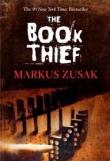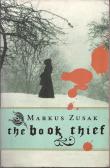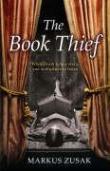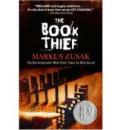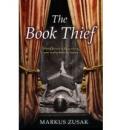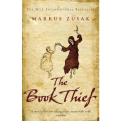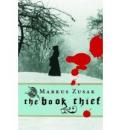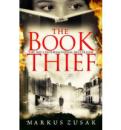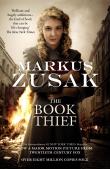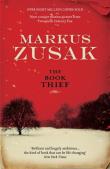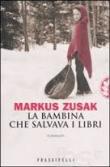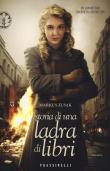AustLit
Latest Issues
AbstractHistoryArchive Description
'It is 1939. Nazi Germany. The country is holding its breath. Death has never been busier, and will become busier still. Liesel Meminger and her younger brother are being taken by their mother to live with a foster family outside Munich. Liesel's father was taken away on the breath of a single, unfamiliar word - Kommunist - and Liesel sees the fear of a similar fate in her mother's eyes. On the journey, Death visits the young boy, and notices Liesel. It will be the first of many near encounters. By her brother's graveside, Liesel's life is changed when she picks up a single object, partially hidden in the snow. It is The Gravedigger's Handbook, left there by accident, and it is her first act of book thievery. So begins a love affair with books and words, as Liesel, with the help of her accordion-playing foster father, learns to read. Soon she is stealing books from Nazi book-burnings, the mayor's wife's library, wherever there are books to be found. But these are dangerous times. When Liesel's foster family hides a Jewish fist-fighter in their basement, Liesel's world is both opened up, and closed down.'
[Source: Libraries Australia. Sighted 30/10/08]
Adaptations
-
The Book Thief
2012
single work
drama
'Liesel Meminger is a young girl struggling to survive in Nazi Germany. Her life is filled with risk and danger but her love of books guides her through a brutal world. Death watches over her, fascinated by humankind's will to live. The Book Thief looks at the terrible cost of violence, bearing witness to our compassion and complicity. When Death tells a story, you listen.'Source: Steppenwolf Theatre Company website, http://www.steppenwolf.org
Sighted: 24/10/2012 -
form
y
 The Book Thief
( dir. Brian Percival
)
United States of America (USA)
:
Fox 2000 Pictures
Studio Babelsberg
,
2013
6342507
2013
single work
film/TV
The Book Thief
( dir. Brian Percival
)
United States of America (USA)
:
Fox 2000 Pictures
Studio Babelsberg
,
2013
6342507
2013
single work
film/TV
An adaptation of Marcus Zusak's novel.
Notes
-
Dedication: For Elizabeth and Helmut Zusak, with love and admiration.
-
Included on the United States Board on Books for Young People and the Children's Book Council (US) 2006 Outstanding International Booklist.
-
Selected in 2012 by Chicage Public Library for 'One Book, One Chicago'.
-
Ranked #2 in ABC1's First Tuesday Book Club '10 Aussie Books to Read Before You Die' 2012 voting ballot.
-
Number 6 on the Better Reading's 2001 Top 100
Number 5 on the Better Reading's 2003 Top 100
Affiliation Notes
-
This work is affiliated with the AustLit subset Asian-Australian Children's Literature and Publishing because it has Japanese, Chinese, Thai, Vietnamese and Korean translations.
The Book Thief is indexed as an adult book, but the affiliation applies because it has been reviewed as a young adult text, and has also won the Michael L. Printz Award for Excellence in Young Adult Literature.
Publication Details of Only Known VersionEarliest 2 Known Versions of
Other Formats
- Braille.
- Sound recording.
- Large print.
Works about this Work
-
y
 Neurocognitive Interpretations of Australian Literature : Criticism in the Age of Neuroawareness
London
:
Routledge
,
2021
21558011
2021
multi chapter work
criticism
Neurocognitive Interpretations of Australian Literature : Criticism in the Age of Neuroawareness
London
:
Routledge
,
2021
21558011
2021
multi chapter work
criticism
'This unique book on neurocognitive interpretations of Australian literature covers a wide range of analyses by discussing Australian Literary Studies, Aboriginal literary texts, women writers, ethnic writing, bestsellers, neurodivergence fiction, emerging as well as high profile writers, literary hoaxes and controversies, book culture, LGBTIQA+ authors, to name a few. It eclectically brings together a wide gamut of cognitive concepts and literary genres at the intersection of Australian literary studies and cognitive literary studies in the first single-author volume of its kind. It takes Australian Literary Studies into the age of neuroawareness and provides new pathways in contemporary criticism.'
Source: Publisher's blurb.
-
Bibliophilia, Bibliomania or Bibliokleptomania? Liesel's Passionate Love Affair with Books in Markus Zusak's The Book Thief
2021
single work
criticism
— Appears in: Interdisciplinary Literary Studies , vol. 23 no. 1 2021; (p. 132-148)'Liborum necesse est se faciat amatorem. Perhaps, as this Latin proverb suggests, it is necessary to fall in love with books, to turn them into lovers. But what happens when this passionate love affair spins out of control? In The Book Thief (2005), Markus Zusak's novel aimed equally at young adult and adult readers, the eponymous protagonist rarely engages with books because they afford stories of enchanting and enchaining interest. Rather, Liesel Meminger seems to hunt and enjoy books for quite different reasons than the delights of storytelling and pure entertainment. I first explore the laws of attraction which make books so beguiling to Liesel, before examining if this impulsive obsession of acquiring books has not become a blatant symptom of bibliomania, and more specifically of bibliokleptomania. After discussing the psychodynamical perception of what is often referred to as book madness, I shall demonstrate these printed works in Markus Zusak's novel are much more than mere storytelling as they fulfil specific functions, all of which challenge the normative way of seeing texts, literary and otherwise.'
Source: Abstract.
-
Markus Zusak's Follow-up to The Book Thief, Bridge of Clay, Was 13 Years in the Making
2018
single work
column
— Appears in: ABC News [Online] , December 2018; -
Pushing Aside the Nazi : Personal and Collective Exculpation and the Everyday German in Markus Zusak's The Book Thief
2016
single work
criticism
— Appears in: Dapim : Studies on the Holocaust , vol. 30 no. 1 2016; (p. 1-15)'In this paper I argue that Markus Zusak's The Book Thief allows for the personal and collective exculpation of the common or ‘ordinary’ citizens of Germany who lived through the Third Reich. By drawing on the German historian Martin Broszat and his historiographical study of ‘everyday’ life under Nazi rule, I establish that the novel creates a number of contentious themes. First, it suggests that the Nazis were a group who resided on the periphery of German society, and that the rise of Hitler's Third Reich was unpopular among the general German population. Second, while Germans later became victims of Allied bombings and/or Russian invasion, the population was also victim to the nation's political situation. In arguing that German citizens were victims of the Nazis, The Book Thief separates a supposed ‘demonic’ social minority from the ‘everyday’ working class. Depicting the German lower classes as innocent bystanders or victims, the book allows its readers and, in particular, its German readers, to reflect upon this tumultuous historical period with some cultural and social moral fortitude intact. Furthermore, the paper suggests that this novel is just one example of a corpus of Australian texts that have, in recent years, reconfigured traditional literary representations of the Nazi regime and the Holocaust.'
Source: Abstract.
-
Readers Again Pick 'Book Thief' as Favourite
2016
single work
column
— Appears in: The Australian , 30 March 2016; (p. 15)'For the third consecutive year, the local young adult title The Book Thief has snaffled the No 1 spot in the Dymocks Top 101 survey, an annual list of readers’ favourite books' (Rosemary Neill).
-
End of Innocence
2005
single work
review
— Appears in: The Bulletin , 13 September vol. 123 no. 6487 2005; (p. 68-69)
— Review of Once 2005 single work children's fiction ; East of Time 2005 single work autobiography ; The Book Thief 2005 single work novel -
Words as Crumbs that Lead to Salvation
2005
single work
review
— Appears in: The Canberra Times , 10 September 2005; (p. 17)
— Review of The Book Thief 2005 single work novel -
Stolen Books from a Stolen Childhood
2005
single work
review
— Appears in: The Age , 10 September 2005; (p. 5)
— Review of The Book Thief 2005 single work novel -
Reading the Horror
2005
single work
review
— Appears in: The Weekend Australian , 24-25 September 2005; (p. 15)
— Review of The Book Thief 2005 single work novel -
Of Life and Death
2005
single work
review
— Appears in: The Advertiser , 1 October 2005; (p. 12)
— Review of The Book Thief 2005 single work novel -
The Face : Rosemary Neill Meets Markus Zusak : Writer
2005
single work
column
— Appears in: The Weekend Australian , 3-4 September 2005; (p. 3) -
Hope Amid the Flames
2005
single work
biography
— Appears in: The Sydney Morning Herald , 24-25 September 2005; (p. 20-21) -
Big Words from the Smallest Rooms
2006
single work
column
— Appears in: The Sydney Morning Herald , 1-2 April 2006; (p. 19) A column canvassing current literary news including Marcus Zusak's success in the USA literary market and the reliablity (or otherwise) of bookselling statistics in Australia. -
Life During the Holocaust Inspires Voice of Death
2006
single work
column
— Appears in: The Canberra Times , 22 April 2006; (p. 11) -
Undercover
2006
single work
column
— Appears in: The Sydney Morning Herald , 22-23 April 2006; (p. 30) A column canvassing current literary news including the re-vamping of Australian Author and the overseas reception of Marcus Zusak's The Book Thief.
Awards
- 2013 honour book KOALA Awards — Fiction for Years 7-9
- 2009 winner German Youth Literature Award — Jugendjury Die Bücherdiebin
- 2009 winner Deutsche Jugendliteraturpreis
- 2009 winner Deutscher Jugendliteraturpreis — Preis der Jugendjury For the [2009] German edition translated by Alexandra Ernst.
- 2008 winner Ena Noël Award
- 1939-1945
-
cGermany,cWestern Europe, Europe,

